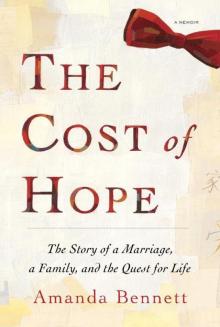- Home
- Amanda Bennett
The Cost of Hope
The Cost of Hope Read online
ALSO BY AMANDA BENNETT
The Death of the Organization Man
The Man Who Stayed Behind
(with Sidney Rittenberg)
The Quiet Room
(with Lori Schiller)
In Memoriam
(with Terence B. Foley)
Your Child’s Symptoms
(with Dr. John Garwood)
Copyright © 2012 by Itzy
All rights reserved.
Published in the United States by Random House, an imprint of The Random House Publishing Group, a division of Random House, Inc., New York.
RANDOM HOUSE and colophon are registered trademarks of Random House, Inc.
Bennett, Amanda.
The cost of hope : a memoir / Amanda Bennett.
p. cm.
eISBN: 978-0-679-60484-6
1. Foley, Terence Bryan—Health. 2. Cancer—Patients—
Biography. I. Title.
RC265.6.F65B46 2012
362.196′9940092—dc23
[B] 2011040660
www.atrandom.com
Cover design: Thomas Beck Stvan
Cover illustration: Darren Booth
v3.1
For Terry and Georgia
Contents
Cover
Other Books by This Author
Title Page
Copyright
Dedication
Prologue
Chapter 1
Chapter 2
Chapter 3
Chapter 4
Chapter 5
Chapter 6
Chapter 7
Chapter 8
Chapter 9
Chapter 10
Chapter 11
Chapter 12
Chapter 13
Chapter 14
Chapter 15
Chapter 16
Chapter 17
Chapter 18
Chapter 19
Chapter 20
Chapter 21
Chapter 22
Chapter 23
Chapter 24
Chapter 25
Chapter 26
Afterward
Acknowledgments
Permissions
About the Author
Prologue
The foreign correspondent’s apartment not far from mine in Peking is warm with music and laughter. It is Saturday, September 3, 1983, and I have been working here as the lone Wall Street Journal reporter for more than seven months. Tonight, a story I am trying to write will not be tamed. Frustration has chained me to my typewriter late into the night, and now I am looking for some diversion.
There is so little to do in China at night that any party is a magnet, not just for newspeople, but for the diplomats and businesspeople who are every bit as isolated and lonely as we are. At any party you are as likely to find wildcatters as bankers, and diplomats from Bali, Paris, and Manila mixing with journalists from Bombay and Madrid. The Africans mainly socialize among themselves, as do most of the Japanese. But every other nationality and profession mixes indiscriminately on any occasion.
I step in from the darkness.
Everyone is dressed to relax, in jeans, shirts, and ratty sweaters. I am wearing my usual work outfit of sweatpants and a shirt two sizes too big. Over on the sofa, though, the guy with a drink in one hand and a cigarette in the other is wearing a gray three-piece suit. And a bow tie. A bow tie! The person sitting next to him gets up to leave. Before I can look away, Mr. Bow Tie beckons me to the empty seat.
By way of conversation with a stranger, I explain what I am doing there, and about the story that is stumping me, the one that has kept me at my desk so late on a Saturday night. Terence Foley turns out to be an expert on the very subject I am working on. Not just an expert, but a witty one. Erudite. Almost dazzlingly articulate. Who is this man? And what marvelous stroke of luck has landed me next to him at the moment I need him?
We talk so intently that we barely notice the party is winding down and the other guests are drifting off into the near dawn.
Twenty-four years later, in the intensive care ward at the University of Pennsylvania hospital, Dr. Eric Goren tells me Terence, my husband of twenty years, may not live till morning.
It is sometime after midnight on December 8, 2007. Terence Bryan Foley, sixty-seven years old, Mr. Bow Tie, father of our two teenagers, a Chinese historian who earned his Ph.D. in his sixties, a man who plays more than fifteen musical instruments and speaks six languages, a San Francisco cable car conductor and sports photographer, an expert on dairy cattle and swine nutrition, film noir and Dixieland jazz, is confused. He knows his name but not the year. He wants a Coke.
Should Terence begin to hemorrhage, the doctor asks, what should he do?
It’s the kind of question medical professionals like Dr. Goren and families like ours face every day. Can we—should we—prolong this beloved person’s life? For a few days? A few weeks? If we are lucky, for longer?
This is Terence’s and my third end-of-life warning. We’ve won seven years. Can we get more?
Dr. Keith Flaherty and I both believe—hope—that a new medicine Terence has just begun to take will buy him more time.
Keep him alive if you can, I say. Let’s see what this new drug can do.
What I couldn’t know then was that the thinking behind my request—keep him alive if you can—along with hundreds of decisions we made over seven years, would illustrate the impossible calculus at the core of life, of love of family, and of the U.S. health care debate.
Backed by medical insurance provided by my corporate employers, we were able to fight for Terence’s life with a series of expensive last chances like the one I asked for that night.
How expensive?
When I finally knew, the bills totaled $618,616, almost two-thirds of it for the final twenty-four months. Most of the money was for treatments that no one can say for sure helped extend his life.
This is not the tragic story of a family denied care for lack of resources, or of the struggles of the more than 46 million uninsured Americans. Quite the contrary. Our insurance coverage gave us access to the best medical care all across the country. It isn’t our children’s story either. Terry, now twenty-two, and Georgia, now seventeen, were at the center of everything throughout. It is for them especially that Terence wanted to live on. In this book, though, they play only cameo roles. I have their permission to tell their dad’s story, and mine. I do not have their permission to tell theirs. They were children when most of this story took place and teens when their dad died. They are protective of their thoughts and feelings and their relationship with him; I am protective of their privacy. Perhaps someday they will want to tell their own stories. This, however, is not that story.
Instead, this is about Terence and me. About the choices we made. It is about a marriage and love. About a man and his life. It’s about family and everything we did to try to save the husband and father at the core of it. It is also the story of how I set about to understand, after Terence died, why I did what I did, why the doctors did what they did, and why Terence did what he did—and to try to find out the cost of hope.
1
It almost always begins in darkness, my memory’s trip back to the China where Terence and I meet.
In the first week of February 1983, I fly in to Peking to take up my post as the correspondent for The Wall Street Journal. I am looking out the window of a Pan Am flight as it circles, preparing to land. Below is the country’s capital, one of the world’s biggest cities. This is not the China of the Olympics, the futuristic seventy-story towers and magnetic trains, of stylish wealthy entrepreneurs and world-devouring currency reserves. In 1983, eleven years after President Nixon’s 1972 walk along the Great Wall, the country is still en
meshed in the shock and trauma of the Cultural Revolution and of the turbulent three decades since the People’s Republic of China was formed in 1949. It’s still easy to see the gashing wounds from years of isolation, poverty, and the political instability of the Cultural Revolution that has barely ended.
Peking—it is still Peking in those days—is the home of 9.3 million people, yet there is none of the exuberant burst of light that normally greets travelers flying into a big city. There are no ocher ribbons of highway spiraling out from the city’s center, nor do snakes of white headlights flow in one direction, red taillights in another. No massive office buildings flaunt shining squares into the night long after the workers have left for home. There are no cheerfully lighted houses either, no boxlike warrens of high-rise apartments fanning out to lighted loops of suburban cul-de-sacs. Instead, here in China’s capital in the early 1980s, most people still live in dark one-story brick or stone courtyard houses with public street latrines. Even in the center of the city, some families still raise chickens and small pigs. Many homes still have no electricity at all.
It is a dark and silent city. In 1983 the country still hasn’t recovered from the decadelong nightmare of the Cultural Revolution that pitted colleague against colleague, neighbor against neighbor, child against parent. The bleakness disturbs me. There are only a handful of cars—some owned by a tiny city-owned taxi fleet, a few driven by diplomats or journalists, as well as the hulking Russian-style Hongqi limousines favored by high-ranking Party officials. Someone sometime told someone that headlights burn gasoline, so only parking lights are used at night. The cars are ghostly shadows with tiny yellow cats’ eyes.
Almost all the necessities of life—food, clothing, shelter—are supplied by the factory or office. Stores have only recently begun to reemerge, but most shop windows are still boarded up or plastered over. For many weeks I don’t even realize that these darkened doorways are stores. It is a dingy, featureless wasteland.
For the first several months I live alone in an apartment that is also my office. While the telex clatters behind me, every night I stand on the twelfth-floor balcony looking down into the dark night toward the southeast of the city. I live herded together with the other journalists and diplomats in this walled compound of cinder-block buildings, guarded—and watched—by soldiers.
The winter air is bitter with the smoke of the soft coal briquettes that people use to heat their houses. Off in the distance I hear the wail of a train whistle. Directly below me, metal clops against asphalt as the horse-drawn delivery carts still allowed into the center city after sundown make their nightly rounds. Even late at night the streets pulse with bikers heading to work or back home or who knows where. Only the barest hint of color—a sleeve, a scarf, a ribbon—has begun to appear here and there to brighten the Communist-era Mao-style dress. Otherwise the bikers, both men and women, are all dark. Dark jackets. Dark trousers. Dark shoes. Dark hats. Dark bikes.
I stand on my balcony and think how lucky I am to be here at this historic moment—how excited, and at the same time how frightened, alone, and confused I am in this bleak, strange, unwelcoming place.
On Saturday, September 3, 1983, as midnight approaches I am still working. I work pretty much all the time. Just as I am starting to fade with exhaustion, New York wakes up with its barrage of questions and comments and demands. Working all day and then answering the phone through the night adds a kind of surreal, never-quite-awake/never-quite-asleep quality to my life in China.
Tonight I struggle with the story that just won’t fall into shape. Mikhail Kapitsa, a Soviet deputy foreign minister, is set to arrive in the capital. He is the highest-ranking Soviet to visit since China and the Soviet Union broke off relations in 1960. Because the two countries had split, few Soviet experts are left in China, at least ones willing to talk. I can find almost no one who understands the politics of both countries well enough to explain the significance of the visit. There is no Internet; I check the indexes of all the reference books I have brought and find nothing. My interviews have been next to useless.
I planned to skip the party that John Broder, the Chicago Tribune correspondent, is throwing. I must get this piece written! But I am worn out, lonely, and discouraged. I leave the yellow sheets in the typewriter and wander over, intending to stay for only a few minutes. John Broder is a witty, lively, guitar-playing bon vivant. His wife is beautiful and dark-haired with a wisp of an exotic accent—Israeli? Their party is an event.
The bow-tied man on the sofa across the room is wearing horn-rimmed glasses. He looks a bit out of place, maybe even a bit out of time. He’s older than the others. Stouter. More formal.
When he motions me over, I settle in next to him and begin to tell him the subject of my troublesome story. His eyes light up. Sino-Soviet politics are his specialty, he says. In fact, he is here in Peking as a Fulbright scholar, on a one-year fellowship to China precisely to study the relations between China and the Soviet Union. We begin an intense conversation about the personal and professional hostilities between Mao and Stalin that had led to the countries’ rift in the 1950s. The terrible economic price China had paid for the split. The effect on world politics of the two rivals, and the change in balance of power when the United States opened its arms gingerly again to China. It is a masterful discussion. Just what I have been missing. Just what I need. I am not so much of a geek as to bring a notepad to the party, so I try to memorize as much as I can before, close to 3:00 a.m., I say good night and walk home alone. I live only two buildings over, inside the compound surrounded by soldiers. By the next morning I remember the substance of the talk but not the man’s name.
That afternoon I call our host. The Fulbright scholar? John is stumped. People just show up at his parties. He didn’t know half the people in the room. I make a few other calls, but no one seems to recall the proper middle-aged man with the owlish glasses and bow tie. Without a name to pin the observations on, I’m not comfortable writing the story, so I let it go and chalk it up as another disappointment.
A few months go by. I have almost forgotten about him in the press of work. Then, without warning, I spot him again at another staple of 1980s China social life—a bank reception. A big American bank is opening its office here. It has rented the courtyard of a lovely old prerevolutionary home. The space is filled with the usual assortment of businesspeople, journalists, and Chinese officials in Mao jackets. There are drinks and hors d’oeuvres and endless speeches about friendship and cooperation. He is standing alone.
“I’ve been looking for you,” I say.
“I was going to call,” he answers. “I’ve been traveling.” This time, at a business occasion instead of a party, he automatically hands me his card, as I just as automatically hold out mine.
TERENCE B. FOLEY
COUNTRY DIRECTOR
AMERICAN SOYBEAN ASSOCIATION
“Soybeans? I don’t understand. You said you were a Fulbright scholar. Studying Sino-Soviet relations.”
He shrugs. “You’re cute. You’re a journalist. I wanted to talk to you. Journalists are always working. How long would you have talked to me if I told you I was in soybeans? You wanted to talk about China and Russia, so I made up a person who could talk about China and Russia. I knew you’d find out sooner or later.”
Soybeans?
Made it up?
I stare at the card.
“You asshole!” I finally blurt out. “You could have gotten me fired!” I stamp away.
And that is how we met.
Years later, this becomes our signature story, a kind of stand-up routine for both of us. When our children are old enough, we tell them the story at least once a year.
At his funeral, I stand up and tell it alone.
I don’t see him again until about three months later, on February 2, 1984. It’s Chinese New Year, the first day of the Year of the Rat. I spot him in a boarding lounge in Tokyo, both of us heading back to the city that by now has been renamed Beijing. I
’m on my way back from my first home leave. He’s coming back from who knows where. He is in business class and doesn’t see me turning right into coach.
There aren’t more than a dozen people in the cavernous rear of the plane. All commerce and diplomatic work stops for the New Year holiday, and no sane tourist goes to frigid, polluted Beijing in February, which a colleague once described as like being stuck inside a vacuum cleaner bag inside a freezer. Exhausted from a full day of upright flying back from my leave in New York, I lie down across three seats and fall asleep.
When we arrive in Beijing at midnight, the airport is more dreary than usual. Even in broad daylight the Beijing airport is a depressing place, cold and barren and more like a military hangar than a modern commercial airport. Even at its bustling peak, there is no food. No publicly available phones. In those days before cellphones, once inside the airport, you were nearly cut off from the rest of the world.
Tonight, the baggage handlers sullenly fling the bags onto the wooden pallets. Eager to get home for the holiday, skinny pig-tailed girls wearing khaki green airport service uniforms scurry around flipping off light switches even before the plane is fully unloaded. I look around. The few people on the plane have been met by relatives, or by their work units, or by their drivers. My own driver is home with his family. I gave him the holiday off, thinking taxis would certainly be available. Tonight there are none. It is minus 14 degrees Celsius—not even 7 degrees Fahrenheit. There is an eighteen-mile-long deserted road fringed with linden trees between me and home.
Then I spot him over by a service desk, a telephone in his hand. He is a hefty man but even across the room he looks oddly puffed up like Santa Claus, a navy greatcoat ballooning around him. He has found an airport telephone tucked inside a service desk. I give him points for that. Still, I feel a faint wave of contempt. Of course he is going to need me to help him translate. I am no expert, but I have quickly made myself functional in the language. Older American businessmen, in my experience, have not.

 This Family of Ours (Raine #6)
This Family of Ours (Raine #6) Faithless
Faithless The Heart of Mine
The Heart of Mine Unbreakable Hearts (Broken Series #3)
Unbreakable Hearts (Broken Series #3) This Obsession of Mine (Raine Series #5)
This Obsession of Mine (Raine Series #5) Simple Lies
Simple Lies Chasing Carson
Chasing Carson The Secret About Christmas
The Secret About Christmas Breaking Beautiful (Broken Series #2)
Breaking Beautiful (Broken Series #2) This Trust of Mine
This Trust of Mine Protecting Lyndley
Protecting Lyndley This Courage of Mine
This Courage of Mine Beautifully Broken
Beautifully Broken The Cost of Hope
The Cost of Hope